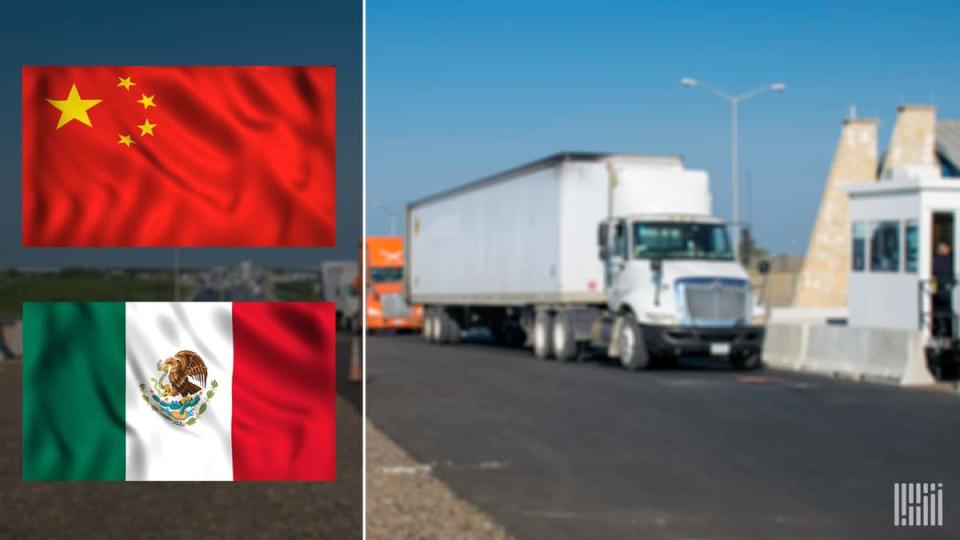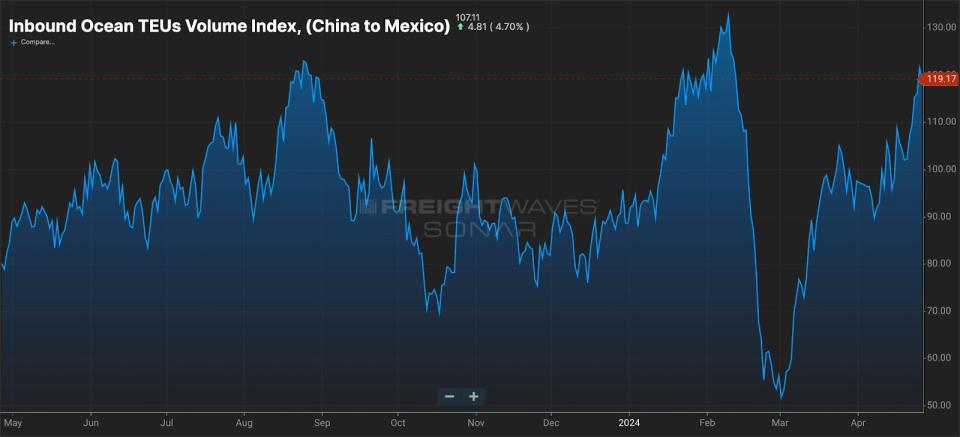
Borderlands is a weekly rundown of developments in the world of United States-Mexico cross-border trucking and trade. This week: China boosts its Mexico investments as nearshoring opportunities grow; Realterm acquires truck terminal in El Paso, Texas; Horton Automatics opens plant in Matamoros, Mexico; and Schunk invests $7 million to expand in Queretaro, Mexico.
China boosts its Mexico investments as nearshoring opportunities grow
Alberto Garcia-Jurado was recently touring the Mexican city of Queretaro when something immediately jumped out to him.
Garcia-Jurado is the CEO of San Antonio, Texas-based InZynch LLC, a collaboration system performance firm. He also served for six years as president of the Gulf Chapter of the United States-Mexico Chamber of Commerce.
“One of the things that shocked me was the huge Chinese presence I saw in Queretaro, such as 60% of the new car dealerships are Chinese — General Motors, Ford, they’re disappearing,” Garcia-Jurado told FreightWaves. “But it’s not only car dealerships, most of the new industrial parks that are being set up are being set up for Chinese companies. It was shocking.”
Garcia-Jurado was traveling through Queretaro for a cross-border business event he helped organize in Mexico called “How to take Advantage of the Texas Moment.” He said everywhere he went, local business people told him they were seeing a surge of companies from China arriving in Mexico.
“On the one hand, I think it has to do with the trade war between the U.S. and China, and all the bad political blood and everything,” Garcia-Jurado said. “Chinese companies are finding it harder to get into the U.S. But if they set up shop in Mexico, then they can come from the south, access the U.S. market through Mexican ports.”
The U.S. can’t afford to become complacent in trade relations with Mexico just because they are neighbors, Garcia-Jurado said.
“Chinese businesses are actually displacing a lot of traditional U.S. companies,” Garcia-Jurado said. “I think that the problem is that in the U.S., we became complacent, because Mexico has always been in our backyard, and the dominant entity for business in Mexico has always been the U.S.”
Recent data shows that Mexico is becoming an increasingly popular destination for Chinese companies looking to serve both local markets and possibly the U.S.
According to Mexico’s Secretary of the Economy, there were 378 foreign direct investments (FDI) announcements totaling over about $6.4 billion last year.
Private sector businesses from the U.S. were the top investors in Mexico, accounting for 38% of FDI. China was ranked second in FDI at 12%, followed by Denmark (9%), Australia (7%) and South Korea (6%).
The investments are expected to create 234,725 jobs, with almost 50% of the FDI announcements related to the automotive industry. Other manufacturing sectors benefiting from FDI investments include steel and iron manufacturing), electronic components and the food and beverage industry.
The Mexican states that received the highest FDI from China last year were the northern states of Nuevo Leon and Coahuila; and the central states of Guanajuato and Queretaro.
Along with Queretaro, the Mexican city of Monterrey has been another big beneficiary of Chinese investments, such as the development of a $5 billion factory from the China-based Lingong Machinery Group that was announced in October.
Victor Cadena, vice president of the Mexican Chamber of Commerce in China (MEXCHAM), said the two countries have a long history of trade relations.
MEXCHAM was founded in 2007 and is headquartered in Beijing, China. The organization’s goal is to strengthen trade between Mexico and China.
“Mexico and China have 52 years of diplomatic relations,” Cadena told FreightWaves. “Bilateral trade last year between Mexico and China was around $130 billion. Chinese FDI in Mexico is also growing, especially over the last few years due to the nearshoring effect.”
Cadena said the automotive industry is one of the key sectors for China-based investors in Mexico.
“Certainly the automotive industry is a key industry in Mexico, as Mexico is the seventh-largest carmaker globally and one of the main suppliers to the North America market,” Cadena said. “Companies such as Audi, BMW, Ford, GM, Honda, Hyundai, KIA, Mazda, Nissan, Mercedes Benz, Toyota and VW, all have manufacturing plants in Mexico, all together 25 automobile plants in Mexico. Several Chinese car makers have announced their intention to set up a plant in Mexico in the near future too.”
Other manufacturing sectors in Mexico drawing interest from Chinese investors are electronics, such as home appliances, TVs and personal computers, which “have deep roots in the country as well, and the supply chain is also well developed,” Cadena said.
In recent months, some trade experts have alleged that China-based companies and their sourcing partners are bypassing U.S.-based tariffs by bringing goods into Mexico before sending them across the border, essentially making them “Mexican” imports.
Since the beginning of March, import container bookings from China to Mexico have increased over 130%, according to FreightWaves Inbound Ocean TEUs Indices (IOTI). The index measures bookings of twenty-foot equivalent units on a 14-day rolling average based on departure date from the port of lading.

“With a sizable portion of these goods likely being trucked into the U.S., it gives rise to the possibility that China’s increase in trade with Mexico is being used to circumvent tariffs placed on imports from China to the U.S. as part of the ongoing trade war,” Xeneta chief analyst Peter Sand wrote in a recent blog post.
U.S. authorities have pressured Mexico to end tax breaks and other incentives for Chinese companies in recent months, according to Reuters. Last week, Mexican authorities announced they would halt incentives to Chinese electric vehicle makers.
Cadena said while Mexico and China have strong economic ties, the U.S. will likely remain Mexico’s strongest trading partner because of geographic proximity.
“In 2023, the U.S. traded $798 billion with Mexico, hence Mexico became the largest U.S. trading, taking over the position from China,” Cadena said. “Certainly, in some extension this is due to the nearshoring effect. Companies manufacturing in China relocated or are relocating in Mexico. The upgraded USMCA is also a very mature instrument.”
The United States-Mexico-Canada Agreement trade pact (USMCA), formerly known as the North American Free Trade Agreement, was established 30 years ago and its foundations and regulations provide solid bases and certainty for doing business within the North America region, Cadena said.
“Latin America and the Caribbean is not as homogeneous as people would believe, there are more than 30 countries, really different in territory, population, gross domestic product, roles of central banks, exports and imports diversification, competitive advantages, etc.,” Cadena said. “Certainly, China became the largest trading partner of several Latin American countries, but that is not the case of Mexico, even though China is the second largest trading partner of Mexico, the U.S. is still the largest. To put it into context, trade between the U.S. and Mexico is about six times the size of the trade between China and Mexico, so it’s not really comparable. But Mexico and China are complementary economies.”
Garcia-Jurado, who travels frequently in Mexico, said he would like to see more U.S. companies take interest in doing business in cities across the country.
“We better start more proactively reaching out and closing those ties with many Mexican cities and towns and areas where there’s a ton of opportunity before the Chinese settle down there and become the overwhelming, most important presence,” Garcia-Jurado said. “We need to reestablish the conversation, talk to companies in Austin or Dallas, and let them know how much money can be made in [Mexican] cities like Queretaro, Monterrey and Puebla.”
Realterm acquires truck terminal in El Paso, Texas
Realterm announced Thursday it has acquired a 20,000-square-foot truck terminal in El Paso, Texas, according to the American Journal of Transportation.
The facility includes 22 doors for tractor-trailers and a 4,036-square-foot maintenance shop. The property is fully leased to DC Logistics, an asset-based transportation and logistics provider.
“Our expansion into El Paso underscores our commitment to acquiring unique properties tailored to the demands of high flow through tenants,” Ed Brickley, managing director, senior fund manager at Realterm, said in a statement.
Annapolis, Maryland-based Realterm is a global investment manager focused on the transportation industry.
Horton Automatics opens plant in Matamoros, Mexico
Corpus Christi, Texas-based Horton Automatics recently opened a $20 million manufacturing facility in Matamoros, Mexico. The 200,000-square-foot facility will manufacture automatic doors for businesses, institutions and transportation systems.
The new facility, which replaced two existing plants in the same city, will employ more than 200 direct and indirect workers.
Founded in 1960, Horton Automatics designs, manufactures and sells automatic and manual doors. In January, the company ceased production operations at its longtime plant in Corpus Christi and laid off 63 workers.
Schunk invests $7 million to expand in Queretaro, Mexico
Manufacturing company Schunk recently announced plans to expand its factory in Queretaro, Mexico.
The $7 million expansion will create an additional 250 jobs and expand manufacturing capacity, according to CEO Kristina Schunk. The company produces toolholding, gripping technology and automation technology for various industries.
“We started in Queretaro in 2000 and seven years ago we decided to make a larger investment,” Schunk told El Economista. “We have decided to make another very large investment in our plant, where we have different disciplines, from engineering to sales and production, we decided to invest again
The company did not provide a timeline for the expansion’s completion. Heuchelheim, Germany-based Schunk has more than 3,500 employees in nine plants and 34 subsidiaries around the world.
Truckstop CEO: Industry uniting in fight against load board fraud
Borderlands Mexico: US-Mexico trade rises to $67B in February
Samsara opens new office to focus on expanding cross-border trade
The post Borderlands Mexico: China boosts its Mexico investments as nearshoring opportunities grow appeared first on FreightWaves.
